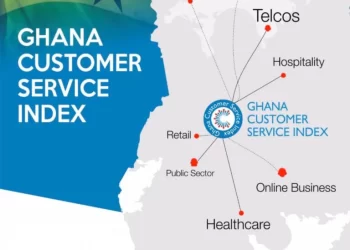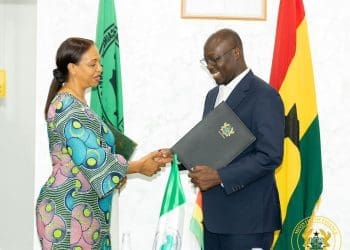Ghana’s 2026 Budget has come under sharp scrutiny in Parliament after the Member of Parliament for Tano North, Dr Gideon Boako, delivered a blistering critique of what he described as misguided fiscal consolidation, questionable expenditure reporting, and widening gaps between budget promises and actual delivery.
Speaking during the debate on the government’s economic policy and financial estimates for 2026, the former economic adviser argued that the Finance Minister’s approach to managing the economy prioritised cosmetic improvements over genuine growth, ultimately depriving key sectors of much-needed resources.
Dr Boako accused the Minister of pursuing an extreme form of fiscal tightening that “makes the books look good at the expense of the good people of Ghana.”
What the government presents as fiscal discipline, he argued, is in reality a form of “fiscal indiscipline” that sacrifices development and social welfare for narrow macroeconomic benchmarks.
The MP insisted that his concerns were not political theatre but grounded in stark evidence of deep funding cuts across the economy.
Major cuts to goods, services, and investment
He pointed out that government spending on goods and services had been slashed by 44% in the first three quarters of the year, while capital expenditure suffered an even more dramatic 66 per cent reduction.
According to him, this translated into an investment gap of approximately $1.1 billion—an amount he believes represents lost opportunities for job creation, infrastructure development, and economic expansion.
The MP warned that the magnitude of these cuts undermines the productive sectors that must drive medium-term growth.
The lawmaker argued that these shortfalls were not merely statistical issues but had real consequences across the country. Ministries, departments, and agencies, he said, simply lacked the resources to perform their mandated functions.
In several cases, programmes that had been approved by Parliament and budgeted for in 2025 were not funded, hindering the ability of institutions to deliver services or sustain development projects.
“It is very evident that resources were not delivered to the intended priority areas to ensure real sector growth,” he told the House, adding that the ripple effects were being felt from agriculture to education and from infrastructure to health.
Ministers reportedly frustrated over lack of funding
Dr Boako further suggested that the dissatisfaction over these funding gaps extended into the corridors of government itself. Without naming names, he claimed that several ministers were unhappy with the Finance Minister’s approach, insisting that “your own ministers are not happy with you because they also have integrity.”
Quoting a popular public refrain, he added: “They are government officials and they have integrity.”
He urged the Minister to reverse course and reorient the budget framework toward what he called genuine expansion of productive and social sectors.
“The ship for Ghana’s economic emancipation must be set sail now,” he declared, warning that further delay risked undermining hard-won macroeconomic stability and weakening the foundations of long-term development.
Questions over big push expenditure reporting
Beyond the funding cuts, Dr Boako also raised suspicions about the accuracy of some expenditure claims in the budget.
He questioned why the fiscal statement indicated that GH¢63 billion had been spent on the government’s flagship Big Push programme, despite official appendices showing significantly lower expenditures.
This, he said, raised concerns about transparency and consistency in the reporting of public finances.
According to him, such discrepancies risk eroding trust in the budget process and leaving ministries frustrated when their approved allocations do not materialise in actual disbursements.
Half of 2025 Budget targets missed
Turning to the government’s performance during the 2025 fiscal year, the MP argued that poor execution was a recurring problem.
He asserted that nearly half of the targets in the 2025 budget were missed, creating what he described as “a significant credibility gap” in the government’s economic planning.
“It is estimated that about 50% of the projections in the 2025 budget were not achieved,” he said, noting that failure to deliver on such a large scale had far-reaching implications for investor confidence, private sector planning, and broader economic stability.
He criticised the Minister’s earlier posture, recalling that he had frequently mocked his predecessors for missing targets.
“Today, the irony is clear,” Dr Boako said, adding that the failures in 2025 revealed deeper structural constraints and weaknesses in policy execution.
He argued that in some of the areas where the government claimed success, closer scrutiny suggests that the underlying methods used to achieve those results were problematic or unsustainable.
Implementation gaps undermining real sector growth
The MP emphasised that the mismatch between budget projections and actual performance meant key sectors were starved of the resources necessary to deliver growth.
He urged the Finance Ministry to adopt more realistic projections, strengthen monitoring and evaluation systems, and improve coordination to ensure continuity between budget statements and actual public spending.
According to him, a budget that cannot be executed as planned “is not a development tool but a political document.”
Inflation strategy, liquidity squeeze
Dr Boako also cast doubt on the effectiveness of the new measures in the 2026 Budget.
He argued that some of the tools proposed for improving tax administration, inflation management, and revenue mobilisation may not yield the intended outcomes.
He raised strong concerns about the inflation strategy, questioning whether the policies used to achieve single-digit inflation were sustainable or economically prudent.
Citing data from the 2026 Budget, he revealed that the Bank of Ghana sterilised GH₵62 billion in 2024 through a combination of Open Market Operations and foreign exchange auctions.
While this helped to withdraw liquidity from the system to tame inflation, he argued that the policy effectively “drained liquidity from the pockets of ordinary Ghanaians.”
The MP maintained that the strategy had imposed a heavy burden on households and businesses, lowering disposable incomes and suppressing private consumption.
Goods remain unsold despite adequate supply
He noted that despite a glut of food and adequate supplies of goods in markets across the country, many of these goods remained unsold because consumers lacked the purchasing power to buy.
In his view, the fact that goods with positive income elasticity of demand—products that people typically buy more of when incomes rise—were not moving off the shelves was a clear sign that monetary and fiscal policy had squeezed households too tightly.
According to Dr Boako, such policy choices risk undermining the very growth the government seeks to achieve.
He argued that the inflation gains claimed by the government were achieved through contractionary tools that may stabilise macroeconomic indicators in the short term but stifle real economic activity in the medium term.
“These tools have come at a steep cost to households and the broader economy,” he warned.
Call for a growth-centred, people-focused budget
Closing his submission, the MP insisted that Ghana stands at a critical juncture, with the 2026 Budget offering both risks and opportunities.
He argued that without a renewed emphasis on real sector growth, transparent reporting, realistic projections, and people-centred policies, the government risks entrenching an economic model that delivers stability only on paper but deprives citizens of the growth and prosperity they deserve.
The debate on the 2026 Budget continues, with stakeholders across the political divide expected to weigh in on the competing visions for Ghana’s economic future.













